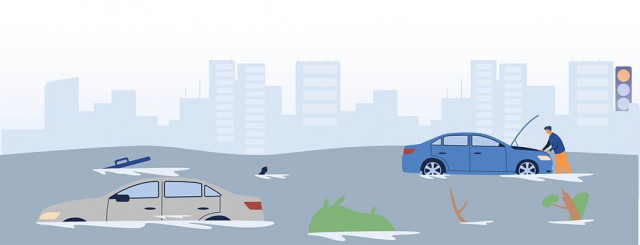Raging rains, climate change put Karachi in a bind this year
Monsoon downpour affected around 2.2 million people in Sindh

Feisty torrential rains across Pakistan in the pandemic-hit 2020 not only highlighted the climate change issues but also laid bare the country’s administrative weaknesses.
This year’s torrential rains also severely affected Sindh and the economic hub of the country, Karachi. According to official figures of the Sindh government, the heavy downpour had affected around 2.2 million people in the province. Thousands of them were displaced from their areas. At least 149 persons died and 103 were injured in rain-related incidents throughout Sindh.
The heavy rains caused severe property damage as well. According to official figures of the Sindh Revenue Board, the torrential rains caused around Rs8 billion losses to public property. Following which, the Sindh government had declared 20 districts of the province as calamity-hit areas.
The torrential rains caused unprecedented urban flooding in Karachi that did paralyse the city life. Several areas were inundated, displacing thousands of people from their houses and causing damage to their household appliances.
The major reason for the unprecedented flooding in Karachi was due to encroachments on drains, which blocked the entire drainage system of the city. According to Sindh government statistics, there are two rivers, 44 nullahs (major drains) and 511 small nullahs in Karachi. Around 13,441 households and 2,948 commercial establishments are built on four nullahs and one river.
There are 5,916 households and 2,412 commercial units on the Gujjar Nullah, 4,480 households and 380 commercial units on the Orangi Nullah, 1,049 households and 156 commercial units on the Mahmoodabad Nullah and 1,996 households on the Malir river.
After the rains brought the country’s financial hub to a standstill, Prime Minister Imran Khan said the government would take concrete steps to resolve the water draining issues permanently. The federal and provincial governments were tasked with clearing up and restoring major drains to their original positions. For this purpose, the National Disaster Management Authority (NDMA) was assigned the job of desilting of nullahs.
According to Director General of Provincial Disaster Management Authority Sindh, Syed Salman Shah, the NDMA is working on different storm-water drains in collaboration with Frontier Works Organisation (FWO).
Talking to The Express Tribune, he said that the focus of the NDMA is on major nullahs of the city, especially the Mahmoodabad Nullah, which directly drains the water into the sea.
“The authorities are also working on the remodelling and redesigning of major nullahs of the city. The Sindh government has been tasked to remove encroachments from nullahs,” he added.
It is pertinent to mention here that the federal government has authorised the NDMA to utilise Rs7 billion on cleaning the nullahs and other related work. Despite having the funds and full institutional support of the federal government, the permanent solution to the problem is shrouded in uncertainty.
Urban infrastructure experts believe that the removal of encroachments from the major nullahs, especially thousands of houses, is a big challenge for the government. According to the experts, removing thousands of households from the nullahs is not an easy job as it is a major humanitarian issue.
Initially, the clearing of the Mahmoodabad Nullah from encroachments was carried out in last November, which was enough to sense the severity of the problem. The residents of Manzoor Colony and other localities strongly resisted the operation.
The Sindh government, as well as the city administration, also lacks the capacity to provide alternative shelter spots to all those families who can be homeless as a result.
Back in August, the federal government had also constituted the Karachi Coordination Committee to supervise the development of the city.
The committee has representation from the federal and provincial authorities, and the Pakistan Army. Currently, it is looking after the clearing up of Karachi’s water drains, removal of encroachments and other related issues. The committee has held multiple meetings at the Sindh Chief Minister House since its formation.
According to a statement from the Sindh Chief Minister House, the provincial government has assigned the compilation of surveys and preparation of the remodelling design of three nullahs - Mahoomabad, Gujjar and Orangi - to NED University under directives of the committee.
The university has submitted a detailed design and remodelling plan of the Mahmoodabad Nullah. The designing and survey of the remaining two nullahs would be completed by January 15, informed the CM House.
The NDMA, which is responsible for the management of all natural disasters, has also identified some problems that affect preparedness and invoke an effective response to crises such as heavy downpours and urban flooding.
The NDMA’s National Monsoon Contingency Plan 2020 has also pointed out “impediments” linked to meteorological predictions and flood forecasting systems. These include the capability to predict medium to long-range forecasting for seven to 15 days and the non-availability of area-specific forecasts or demarcations.
“Deficiency (of equipment) as well as (of) old vintage, meteorological and hydrological sensors has a bearing on qualitative, quantitative (capacity) and precision of weather forecast, especially against erratic weather patterns,” it stated.
The Pakistan Meteorological Department has, however, denied the NDMA’s objections.
Speaking to The Express Tribune, Chief Meteorologist Sardar Sarfaraz said the Meteorology Department has the latest weather forecast system. “We have a supercomputer installed at our Islamabad office”, he stated.
Published in The Express Tribune, December 21st, 2020.



















COMMENTS
Comments are moderated and generally will be posted if they are on-topic and not abusive.
For more information, please see our Comments FAQ